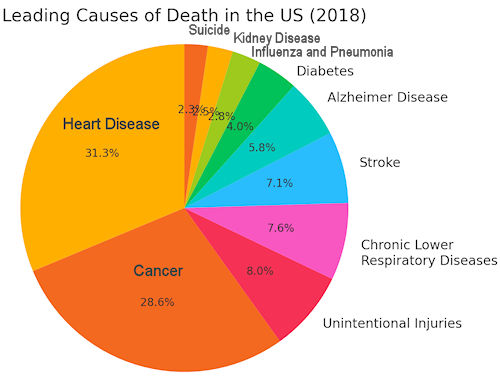- Improving lives since 2002
- Fast, Friendly Service
- Free Nutritional Counseling
The key to health is eliminating toxicities and deficiencies! - Dr. William R. Kellas
The answer that we like best is, “I want to die young, but as late in life as possible” - Dr. William R. Kellas
Medical science has done an absolutely magnificent job of curtailing deaths from infections and traumas, which used to be the leading causes of death. As a result of their brilliant advances in controlling deaths form infection and trauma, the times when 1 out of every 2 people died from infection or trauma are gone. Instead, people now get to reap the consequence of how well they nourish and protect the cells of their bodies.

Of the millions of deaths that occur yearly in the United States, most are related to lifestyle and nutritional factor related diseases.
The goal, of course, is to maintain one’s body so well (See Six Habits of Health) that nothing cuts us short of our maximum longevity as set by our heredity
Heredity includes how many cellular replication binding buds we are born with. We don’t know what the limits are to our longevity potential, but scientists are quite certain that people are capable of far more than is normal at present. Laboratory animals are leading the way, up to 500 years of equivalent to human lifespan.
And, please note that scientists aren’t talking about a lessened quality of life type of living. They believe that we can have our natural strength and vitality and mental acuity literally until our cells are no longer capable of cellular duplication. Then we die, but not from disease, but because our time is truly up.
All of this reminds us of the Biblical Moses, of whom it was said when he was 120 years old - “His eye was not dim, nor his natural force abated.”
Why don’t we live as long as Adam, Methuselah and the patriarchs?
Answer: Because our telomeres die sooner in the polluted modern world with ozone in the atmosphere and ionizing radiation damaging our cells... which did not exist way back then.
Telomeres are the cell replication buds or protein binding sites at the end of each DNA strand. We are born with fifty to eighty in each DNA strand that form the termination or DNA cap. How many we have is a gift of heredity.
During cellular replication cycles (if insufficient nutrients are available) or there are excessive free radical, oxidative events occurring, it is possible for a telomere to be damaged (and subsequently removed from the DNA structure). When the number of telomeres in the telomere cap goes to zero—that DNA cannot replicate itself again.
As your life goes on your cells end up with fewer and fewer telomeres. When the telomere count goes to zero, cell replications can no longer take place. Then, regardless of your level of health, your time is UP.
Six thousand years ago… telomeres lasted longer… because there weren’t so many free radicals in the environment and nutrition was much superior (no mono crop farming creating depleted soils which from which come crops that are mineral deficient).
Today, if we could get vastly increase our antioxidants, methylation facilitators, and general nutrition, all of which stand as bodyguards and maintenance crews to keep our telomeres safe… we could live substantially longer.
<< Pop Up 1 - Enter Your Content Here >>
<< Pop Up 2 - Enter Your Content Here >>
Copyright 2002 - 2024. All rights reserved.
These statements have not been evaluated by the Food and Drug Administration. No product mentioned herein is intended to diagnose, treat, cure or prevent any disease. If you are pregnant, nursing, taking medication, or have a medical condition, consult your physician before making any lifestyle change, including trying a new product or food.
The information on this website is intended as a sharing of knowledge and information from the research and experience of the Healthy-Living.Org staff and contributors. It is not intended to replace a one-on-one relationship with a qualified health care professional and it is not intended as medical advice. You should not use the information on this site for diagnosis or treatment of any health problem or for modification of any medication regimen. You should consult with a healthcare professional before starting any diet, exercise or supplementation program, before starting or discontinuing any medication, or if you suspect you have a health problem. You should keep in mind that cited references to ongoing nutritional scientific study are most likely not accepted by the FDA as conclusive. These references and mentions of benefits experienced by others are disavowed as product claims and are only included for educational value and as starting points for your own research. No food or supplement can be considered safe for all individuals. What may benefit 999,999 of a million people may harm you. Therefore, no one can take responsibility for your health except you in concert with your trusted health professional.